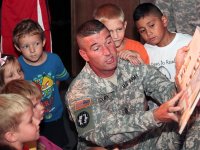Understanding the Needs of Students From Military Families
Children of military and veteran families need to be understand, have their assets celebrated, and be part of a positive school climate. Use the resources we suggest to educate yourself about and identify your military-connected students.
Your content has been saved!
Go to My Saved Content.Depending on how one might estimate, an approximate four million students have parents who are connected to the military, and of those, at least 80% go to public schools. However, teachers often do not know when these children are in their classes, and their many social-emotional needs are not being adequately met.
Children of military and veteran parents was the topic of a White House conference -- Operation Educate the Educators -- convened by Dr. Jill Biden and Joining Forces (a military initiative with First Lady Michelle Obama). I had the privilege of attending the conference last month, and I would like to share some of what I learned.
First, schools should seek to know which children have parents who are connected to the military. These children suffer from what I refer to as ecological disruptions of nurturance. These disruptions are related to frequent relocations, which means changes in schools, peers, health care professionals, and religious institutions.
This is then compounded by overseas or domestic deployments by one or both parents for weekends, weeks, months, or years, potential or actual danger or harm experienced by parents, and the stresses related to parental return and readjustment.
Understand Military Children's Experiences
Second, educators should understand the experiences of children with military-connected parents. The website Joining Forces provides excellent resources, and this short documentary, A Walk In My Shoes: Military Life, may be the quickest and easiest way to get an initial orientation. Schools and teachers should routinely know the occupations of children's parents, and of course, that would lead them to identify children whose parents are in the military.
Appreciate Their Assets
Third, panelist Richard M. Lerner, Ph.D. of Tufts University, at the second general session, made the point that there is considerable diversity of experience within the population of military-connected children, with age and context being strong contributors to the way children cope.
But too often neglected is the plasticity of children, which is an enormous asset. And so, we also can see resilience in many military children, including:
- A strong sense of purpose, inspired by their parents' commitments, helping them be more likely to take on leadership and social action roles
- A capacity to socialize and move fluidly into new social situations
- Knowledge of different cultures and traditions
- An intergenerational commitment to character and service and a devotion to something beyond themselves
Of course, not all children of military families show resilience in all -- or any -- of these areas. But it is important for educators to see their strengths and to view them as potential assets to classroom and school settings.
Creating Welcoming, Supportive Schools
Finally, the guiding principles articulated by the Military Child Education Coalition (MCEC) and presented at the conference noted that all schools must be places of welcome and acceptance for all children.
Children of military families are unique, but share ecological disruptions of nurturance with children who are homeless, in foster care, or who suffer from chronic poverty, or have parents who are incarcerated, chronically medically or mentally ill, or recent documented or undocumented immigrants.
Each of these groups brings assets to schools, but if schools are not oriented to look for them, build them, and celebrate them, the focus is likely to be on children's risk factors and deficits.
A positive school climate dedicated to promoting the social-emotional competence of all children is the front line of support for children of military and veteran families, and all other children. This must be accompanied by the capacity to reach out to parents, and in the case of military-connected children, it's important to seek out the specialized knowledge of resources and supports that these families need.
An excellent and accessible set of resources for schools and educators can be found at MCEC.
What has your experience been with supporting the needs of children from military families? Please share in the comments below.
